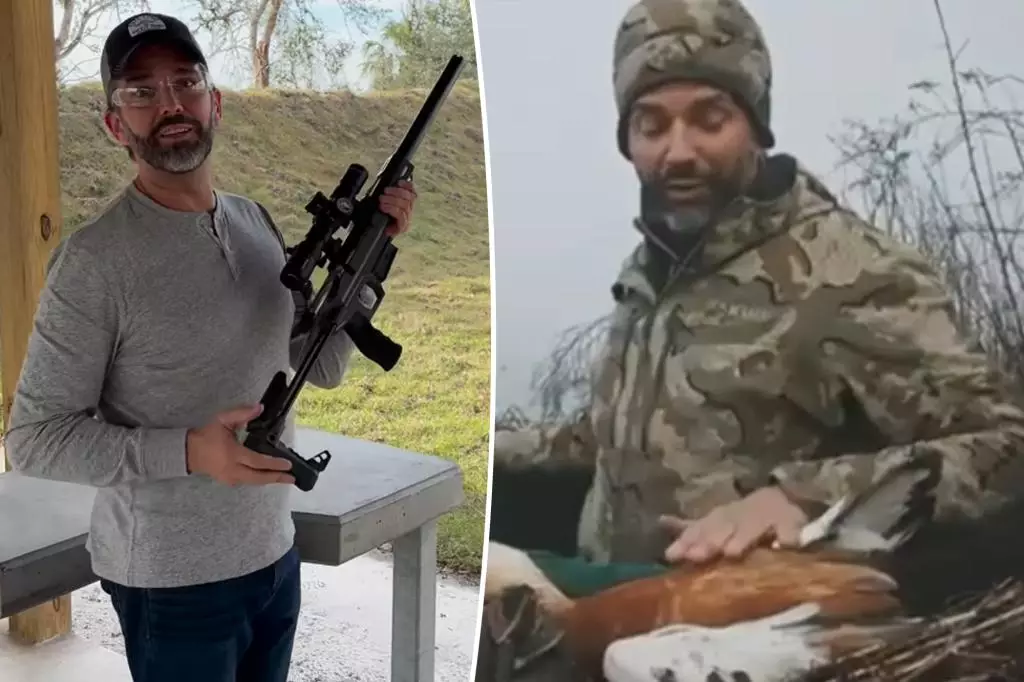In the complex world of hunting, where sport collides with ethical responsibility, Donald Trump Jr. has stepped into controversy once more, igniting a wildfire of outrage among Italian animal activists. The political legacy of the Trump family seems to have a knack for generating headlines, but this time, it’s not just the name ‘Trump’ that’s drawing criticism; it is the alleged actions of the former president’s son that have triggered calls for investigations and compliance with hunting laws.
It was just another hunting trip in a seemingly picturesque locale—Italy, specifically, near the renowned lagoon outside Venice. Here, Donald Trump Jr. was accompanied by his girlfriend, Bettina Anderson, among a reported group of hunters, but what was meant to be a day of sport quickly morphed into a potential legal backlash. Footage had reportedly emerged, showcasing the group hunting ducks, among which was allegedly a rare bird, leading to immediate backlash from both the public and local politicians.
The discovery of this rare bird, believed to be a Ruddy Shelduck, has not only shed light on the questionable ethical implications of hunting but also raised questions about the legality of Trump Jr.’s actions in a foreign country. The hunting outing, which was supposedly documented on Trump Jr.’s website Field Ethos, was met with urgent calls for an investigation into whether all necessary permits and guidelines were adhered to during the hunt. Photos capturing the moment, along with reports claiming Trump Jr. shot around 50 ducks, only worsened the outcry.
Local politicians have been quick to dissect the legality of Trump Jr.’s hunting expedition. Andrea Zanoni, a member of Italy’s Green Party, pointed out that foreign nationals cannot legally hunt in Italy without appropriate residency permits and hunting licenses. The Italian law stipulates that hunting licenses can only be issued to residents of specified regions, emphasizing that hunting in Italy is not simply a tourist sport for casual visitors.
The intricacies of hunting laws are pivotal here. In Italy, hunters must document their excursions meticulously—a requirement that aims to promote conservation and responsible hunting practices. How does one reconcile these stringent regulations with the actions of an internationally recognized figure like Trump Jr.? And if he indeed participated in this controversial hunt without adhering to these laws, could this lead to severe ramifications not just for him but also for how American hunters are viewed abroad?
Responses from the public and politicians alike have illustrated the stark divide between the hunting community and animal rights activists. Critics of Trump’s hunting escapades have pointed to the risk of endangering rare species and potentially undermining conservation efforts already in place in Europe. Activists are not merely lamenting one unfortunate incident; they see their call to arms as a larger battle against hunting as a recreational sport that disregards the rights of animals.
Luana Zanella, a prominent Italian Member of Parliament, was among those pressing the issue, calling for an inquiry into Trump Jr.’s actions. The narrative becomes even more dynamic when one considers public sentiment, especially in today’s socially conscious climate, which favors wildlife preservation over traditional hunting practices. In an era where animal rights are gaining ground, does a high-profile figure like Trump Jr. risk alienating hunters who strive to operate within ethical guidelines?
The incident is reminiscent of past controversies involving the Trump family, particularly the 2019 uproar when Trump Jr. was accused of hunting an endangered sheep in Mongolia. Retroactive permits were eventually obtained, but the damage to public perception had already been done. Each hunting-related incident seems to push the envelope further, raising ethical concerns around high-profile hunting trips.
The overall discourse around Trump Jr.’s Italian hunting trip stretches beyond personal accountability; it intersects deeply with larger discussions of privilege, legality, ethics, and conservation. Rightfully, the question arises: what responsibility do public figures have in setting examples for their followers, especially in an age where environmental concerns are paramount?
As this situation continues to unfold, with investigations potentially looming on the horizon, one cannot help but ponder the future implications for both Trump Jr. and the broader hunting community. Will this incident prompt a reevaluation of existing regulations, or will it fade into the background of social media noise? Regardless, it has already become clear that when it comes to the complex world of hunting, especially on an international stage, the stakes are much higher than anticipated—and so are the consequences.

Leave a Reply